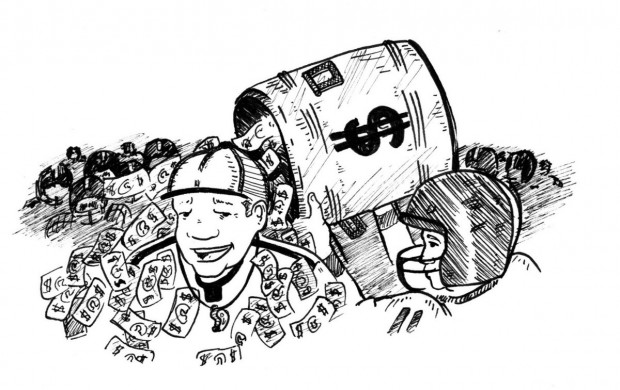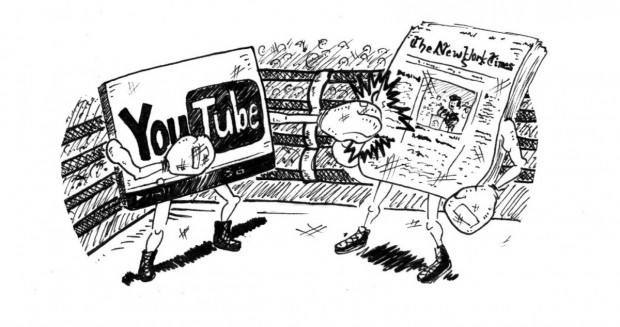Posted on 12 June 2013.
It appears that once again, the wolf is trying to scheme Little Red out of her basket of treats. As congressional Republicans use the recent scandal to attack the Obama administration, tax payers are sharpening their pitchforks to defend conservative groups against the big bad Internal Revenue Service, and the witch hunt seems to grow more vicious each day.
During the past few weeks the House Committee on Oversight and Government Reform has been interrogating front-line and top-desk employees from the IRS office in Cincinnati about an alleged tactic to eliminate conservative organizations by denying them tax-exempt status.
During the investigation, several conservative groups gave testimonies of IRS agents badgering them with obscene questioning, holding their applications unjustifiably and implementing other strategies to either slow down the process or make it more tedious than necessary.
Although the situation escalated into a scandal in May, an email mistakenly sent to the Exempt Organizations Rulings and Agreements unit by Cincinnati IRS employee Elizabeth Hofacre suggests that Washington, D.C. had been aware of the mistreatment of these groups since 2010.
In the message intended to be read only by IRS attorney Carter Hull, the agent claimed that her supervisors had instructed her and other employees to flag organizations identified on a list that was blatantly discriminative toward conservative groups.
The investigation is being overseen by a panel comprising members from both parties and the committee’s chairman Rep. Darrell Issa, R-Calif.

David Delgado/The Daily Cougar
Despite a lack of proof, Issa insists that the mistreatment is an intentional scheme plotted by the Obama administration to debunk conservative ideology and hurt the Republican Party.
Investigative committee member Rep. Elijah Cummings, D-Md., the poster child for congressional Democrats, has openly opposed Issa.
In an interview with ABC news, Cummings demanded that Issa come forward with interview transcripts that prove that the White House is not connected to the scandal.
The spar between Issa and Cumming has compromised the objectivity of the committee. So far it has proven to be more concerned with pinning the blame and characterizing victims as either Democrats or Republicans versus appropriately identifying the problem.
Every day there are new witnesses and evidence coming forth between the hearing, and other panel members need to be able to focus on the information being presented in order to decipher the truth.
The situation is not isolated to the Cincinnati office. According to NBC news, IRS employees in other cities were also sent this list. There may be bigger problems happening with the IRS that are reflective of non-partisan issues within the bureaucratic system.
In 2010, the nonprofit organization, Citizens United, wanted to use its funds to promote a negative documentary film about Hillary Clinton through cable airing and theatrical releases. In the groundbreaking case, Citizens United v. the Federal Elections Committee, the court ruled in favor of the nonprofit and gave corporations rights under freedom of speech that were previously reserved for individuals.
“This ruling allowed people and corporations to make unlimited contributions to the kinds of organizations at the center of the current scandal,” said political science professor Bryan Cole.
“Organizations that are primarily geared toward social welfare can receive tax exempt status. These organizations may sometimes engage in political activities, but if their main purpose is political, then they are not eligible,” Cole said.
In many cases, these corporations and groups are not required to give a list identifying their donors.
In a sense, the IRS has a moral obligation to fulfill its role in protecting our democratic system from being overwhelmed by corporate interest. This is done by discouraging organizations that are merely tools in fundraising for politicians and lobbyists.
“Many, many new groups sprang up following the ruling,” Cole said. “Thus, a more benign explanation would be that the IRS was overworked and exercised poor judgment in terms of taking shortcuts.”
On the other hand, if the accusations being investigated are true and officials were purposely targeting conservative groups, then it would mean that these organizations were being denied their rights under federal law.
It is easier to accept that the IRS is up to something down and dirty. Although the money collected by this department of the government is used for funding Pell Grants and building better schools and neighborhoods, most Americans don’t have positive views of the IRS.
However, we can’t allow fears of tax season and missing the seemingly rigorous deadlines imposed by the IRS to distract us from the situation at hand. The scary, larger-than-life image of “the government” needs to be downsized so that the situation can be appropriately addressed.
One of our country’s most hated government entities is stuck playing the role of the big bad wolf, while a sensationalistic media entertains us with a frivolous partisan debate, and the public takes its opportunity to hit the IRS under the belt.
If we don’t put a stop to this witch hunt, we will never get down to fixing the real problems in the system.
Ciara Rouege is an advertising junior and may be reached at opinion@thedailycougar.com.








